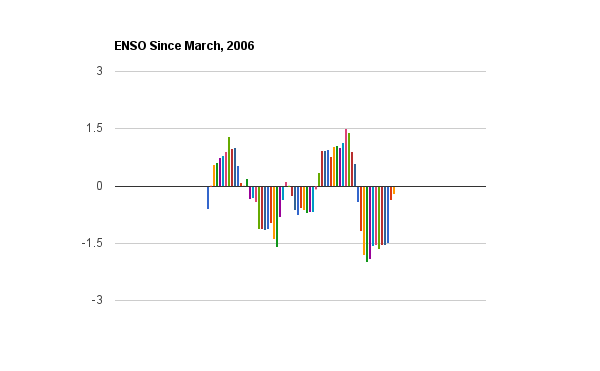March 29, 2006
James Hansen, Makiko Sato, Reto Ruedy, Ken Lo, David Lea and Martin Medina-Elizalde
SUPER EL NINO IN 2006-2007? We suggest that an El Nino is likely to originate in 2006 and that there is a good chance it will be a “super El Nino”, rivaling the 1983 and 1997-1998 El Ninos, which were successively labeled the “El Nino of the century” as they were of unprecedented strength in the previous 100 years (Fig. 1 of Fedorov and Philander 2000).
Further, we argue that global warming causes an increase of such “super El Ninos”. Our rationale is based on interpretation of dominant mechanisms in the ENSO (El Nino Southern Oscillation) phenomenon, examination of historical SST data, and observed Pacific Ocean SST anomalies in February 2006.
We argue further that global warming has increased the likelihood of “super El Ninos”, such as those that occurred in 1983 and 1997-1998. This impact of global warming, if true, is important, because the extreme global climate anomalies associated with super El Ninos are more devastating than the effects of more moderate El Ninos. Our inference is based on a simple physical argument, as we wish to skirt the fact that neither climate models (Collins et al. 2005) nor theory (Fedorov and Philander 2000; Cane 2005) as yet provide a clear answer for the effect of global warming on El Ninos.
DANGEROUS HUMAN-MADE WARMING. Considerations of “dangerous anthropogenic interference” (DAI) with global climate often focus upon possible dynamical instabilities of the
climate system. Much attention has been placed on possible slowdown or shutdown of the Atlantic thermohaline circulation, described as the potential “Achilles heel” of the climate system, sometimes with fanciful discussion of effects in Europe or the United States. We argue that global temperature itself is the best metric for assessing proximity to DAI, as global temperature is related straightforwardly to the principal dangers that the Earth faces.
There was no Super El Nino, and since Hansen made this prediction ENSO has been negative most of the time.



I am sure someone will be along to say that Mr. Hansen was taken out of context, the reporter made up the quote, or that while Mr. Hansen has failed on many such predictions, his science is so wonderful that sooner or later at least some of his predicitons might happen by accident and prove that the evil oil cabal is out to get him yet.
You forgot coal
I will give you one guess who will show up…….
Steve forgot to mention Manhattan …
Yes, its underwater.
Further, we argue that…….We argue further that…..
Nah, he is just being argumentative… 😉
James Hansen: wrong ten ways to Sunday.
Hansen effect. Similar to the Gore effect, but works over larger time scales.
What about the Super-Duper Biggie El Nino? With fries.
Wow, Hansen nailed it!